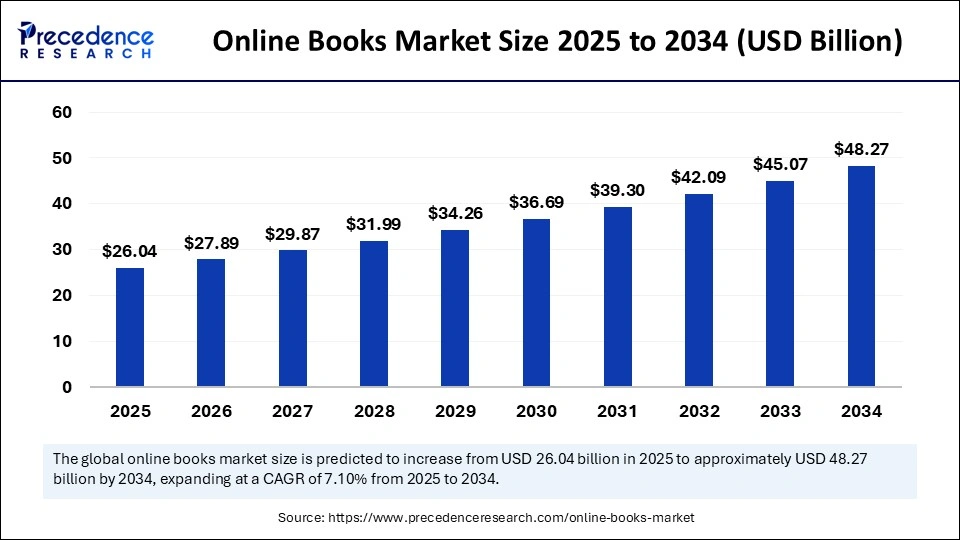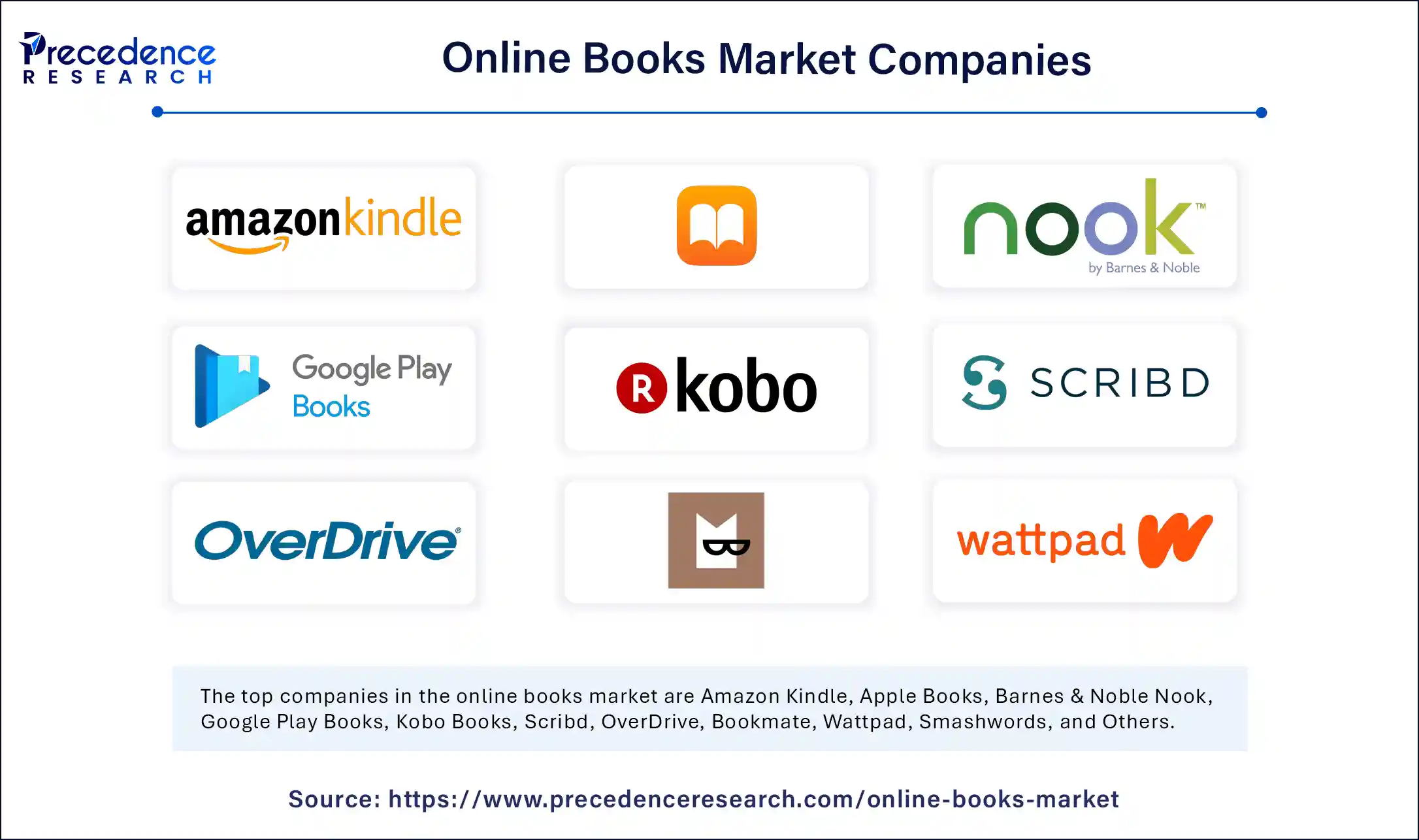The global online books market size is estimated to gain around USD 48.27 billion by 2034 increasing from USD 24.31 billion in 2024, with a CAGR of 7.10%.

Online Books Market Key Points
-
North America led the online books market in 2024, holding the largest share.
-
The Asia Pacific region is expected to register the fastest CAGR from 2025 to 2034.
-
Based on product type, the e-books segment dominated the market in 2024.
-
The audiobooks segment is anticipated to grow at a notable CAGR during the forecast period.
-
By genre, the fiction segment accounted for the highest market share in 2024.
-
The non-fiction segment is projected to witness the fastest growth in the coming years.
-
In terms of distribution channel, online retailers held the largest market share in 2024.
-
Subscription services are expected to expand rapidly over the forecast period.
-
By device compatibility, smartphones dominated the market in 2024.
-
The tablet segment is forecasted to grow at a significant CAGR between 2025 and 2034.
Online Books Market Overview
The online books market has transformed the way readers access, purchase, and consume literary content, evolving rapidly alongside advancements in digital technology and internet penetration. This market encompasses the sale and distribution of eBooks, audiobooks, and digital publications across genres—ranging from fiction and education to research, reference, and professional literature. Online platforms like Amazon Kindle, Google Books, Audible, and Apple Books dominate the space, allowing users to instantly download or stream content to a range of devices.
The shift from traditional print to digital formats has been fueled by the demand for convenience, affordability, and accessibility. With mobile devices, tablets, and e-readers becoming ubiquitous, the consumption of digital books has significantly increased, especially among students, professionals, and global readers in remote regions. Additionally, self-publishing has gained momentum, as authors can directly reach a global audience through digital marketplaces, bypassing traditional publishing constraints.
COVID-19 further accelerated the growth of this market, with libraries, educational institutions, and consumers turning to online platforms for uninterrupted access to reading material. As a result, the market has seen sustained growth, supported by broader digital adoption, changing consumer behaviors, and the integration of personalized content delivery.
Online Books Market Growth Factors
The online books market is growing steadily due to multiple interrelated factors. One of the most prominent is the increasing digitization of content and expanding internet access across both developed and developing economies. With global internet users surpassing 5 billion, the ability to access books online is no longer restricted to a tech-savvy minority but is becoming mainstream.
The rise of mobile devices and e-readers has also played a crucial role. Devices such as Amazon Kindle, Kobo, and smartphones with reading apps offer features like adjustable fonts, offline access, and built-in dictionaries, enhancing the reading experience and making eBooks more user-friendly than ever before.
Another key driver is the growth of online education and e-learning platforms. Students, teachers, and institutions now rely heavily on digital books for academic curricula, test prep, and supplemental learning. The flexibility of online books in being searchable, interactive, and linkable to multimedia resources makes them preferable to traditional print in many educational contexts.
Environmental concerns and sustainability awareness are also encouraging the switch from printed books to digital alternatives, as online books reduce paper usage, shipping emissions, and physical waste.
Lastly, lower costs and instant availability of eBooks and audiobooks contribute significantly to consumer preference. Digital books are often priced more competitively and can be downloaded or streamed instantly, providing an unparalleled level of convenience and immediacy.
Impact of AI on the Online Books Market
Artificial Intelligence (AI) is playing an increasingly transformative role in the online books market, reshaping how content is created, distributed, and consumed. AI-driven recommendation engines are now central to online book platforms, enabling personalized reading suggestions based on individual preferences, reading history, and peer behavior. This not only enhances user engagement but also boosts sales by directing readers to relevant content.
AI is also revolutionizing content creation and editing. Authors and publishers use AI tools to assist with grammar checking, writing style analysis, and even generating short-form content or summaries. In educational and academic publishing, AI-driven summarization tools help condense long texts for easier comprehension and quicker revision.
For audiobooks, AI-generated voice technology is emerging as a viable alternative to traditional narration. AI-powered text-to-speech tools are increasingly able to produce lifelike voices, significantly reducing production costs and turnaround times for audiobook creation—especially for niche titles or multilingual markets.
AI also enables real-time translations and adaptive learning, making it easier to access books in different languages or adjust reading difficulty levels. In educational publishing, adaptive AI platforms can tailor book recommendations and learning paths based on the reader’s performance and progress.
Moreover, AI is streamlining publishing workflows and demand forecasting, helping publishers predict reader trends, optimize inventory for print-on-demand services, and manage digital rights and pricing strategies more effectively.
Market Scope
| Report Coverage | Details |
| Market Size by 2034 | USD 48.27 Billion |
| Market Size in 2025 | USD 26.04 Billion |
| Market Size in 2024 | USD 24.31 Billion |
| Market Growth Rate from 2025 to 2034 | CAGR of 7.10% |
| Dominating Region | North America |
| Fastest Growing Region | Asia pacific |
| Base Year | 2024 |
| Forecast Period | 2025 to 2034 |
| Segments Covered | Product Type, Genre, Distribution Channel, Device Compatibility and Region |
| Regions Covered | North America, Europe, Asia-Pacific, Latin America, and Middle East & Africa |
Market Drivers
A key driver for the online books market is the growing preference for digital and on-demand content consumption. Readers, especially younger demographics, favor digital formats that offer portability, interactivity, and instant access.
The global rise in literacy and education initiatives is also boosting demand. As governments and organizations work to improve access to education, online books offer an efficient and scalable way to distribute learning materials, especially in underserved or remote areas.
Technological integration with other platforms—such as learning management systems (LMS), audiobook apps, and library networks—is creating a more seamless user experience, further encouraging digital adoption.
Another driver is the emergence of subscription models. Platforms like Scribd, Kindle Unlimited, and Audible provide readers with unlimited or bundled access to books for a monthly fee, which increases user engagement and book discovery.
Additionally, self-publishing and independent authorship are reshaping the market landscape. Online platforms allow authors to bypass traditional publishing barriers, offering them higher royalties, creative control, and direct engagement with their audiences.
Opportunities
The online books market is rich with opportunities. One of the most promising is the expansion into regional languages and emerging markets. As literacy and smartphone penetration rise in countries across Asia, Africa, and Latin America, the demand for localized digital content is growing rapidly. Developing content in vernacular languages presents a huge growth opportunity for publishers and platforms alike.
Another opportunity lies in interactive and multimedia books, particularly for children’s education, vocational training, and special needs audiences. These formats can include animations, voiceovers, quizzes, and gamification, offering a more engaging and effective learning experience.
Audiobooks represent another fast-growing segment, driven by the popularity of multitasking consumption—listening while commuting, exercising, or doing household chores. Voice-enabled devices and smart assistants further support the growth of audiobooks in households and cars.
Enterprise publishing and corporate learning offer another lucrative segment. Companies are investing in digital libraries and learning resources for employee training and development, creating demand for specialized, business-focused eBooks and knowledge repositories.
Lastly, blockchain integration in digital rights management (DRM) offers a secure and transparent way to manage copyrights, royalties, and intellectual property, opening new revenue models and improving author-publisher trust.
Challenges
Despite robust growth, the online books market faces several notable challenges. The issue of digital piracy and unauthorized sharing remains significant, threatening publisher revenues and author incomes. Although DRM solutions exist, they often compromise user convenience and face circumvention.
Another challenge is market saturation and discoverability. With millions of books available online, it becomes difficult for new or lesser-known titles to gain visibility. This puts pressure on publishers and authors to invest in digital marketing and platform optimization.
Device and format fragmentation can also create user friction. Different platforms use different file types (e.g., EPUB, MOBI, PDF), which may not be compatible across all devices. Ensuring cross-platform usability without compromising features remains a hurdle.
Cultural and linguistic barriers may limit adoption in non-English-speaking regions unless publishers invest in localized content and language-specific user interfaces.
Lastly, screen fatigue and physical book nostalgia continue to influence user preferences, especially among older readers or those in regions with limited access to reliable digital infrastructure. While the digital format is growing, a significant portion of the global population still prefers the tactile experience of print books.
Regional Outlook
North America holds a dominant position in the online books market, driven by high internet penetration, a strong digital infrastructure, and established platforms like Amazon and Apple. The region has a mature eBook and audiobook ecosystem, with strong adoption across consumer, educational, and corporate segments.
Europe follows closely, with countries like the UK, Germany, and France leading digital reading trends. However, language diversity and differing VAT regulations for digital books across the EU have created a fragmented market landscape.
Asia-Pacific is emerging as the fastest-growing region, with countries like India, China, and Indonesia seeing exponential growth in mobile reading and digital education. Government digital literacy programs, rising middle-class populations, and a shift toward online learning are fueling demand. Local platforms offering books in regional languages are flourishing.
Latin America is also showing increased adoption, especially in educational segments, with Brazil and Mexico being key markets. Internet access and mobile usage are expanding rapidly, enabling broader reach for digital content.
Middle East and Africa are witnessing gradual growth, particularly in urban centers. While infrastructure challenges persist, mobile-first strategies and international aid for educational digitalization are slowly opening up new markets for eBooks and online libraries.
Online Books Market Companies

- Amazon Kindle
- Apple Books
- Barnes & Noble Nook
- Google Play Books
- Kobo Books
- Scribd
- OverDrive
- Bookmate
- Wattpad
- Smashwords
- Project Gutenberg
- Open Library
- Libby
- Hoopla Digital
- Audible
- Thalia
- Tolino
- Storytel
- Rakuten Books
- 24symbols
Segments Covered in the Report
By Product Type
- E-books
- Audiobooks
- Interactive Books
By Genre
- Fiction
- Non-Fiction
- Educational
- Children’s Books
- Others
By Distribution Channel
- Online Retailers
- Subscription Services
- Direct Sales
- Others
By Device Compatibility
- Smartphones
- Tablets
- E-readers
- Computers
- Others
By Region
- North America
- Europe
- Asia-Pacific,
- Latin America
- Middle East & Africa
Also Read: Custom Software Development Market
Get this report to explore global market size, share, CAGR, and trends, featuring detailed segmental analysis and an insightful competitive landscape overview @ https://www.precedenceresearch.com/sample/6095
You can place an order or ask any questions, please feel free to contact at sales@precedenceresearch.com|+1 804 441 9344